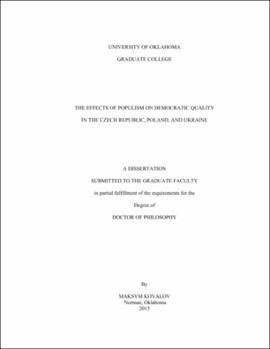| dc.contributor.advisor | Smith, Mitchell P | |
| dc.creator | Kovalov, Maksym Y | |
| dc.date.accessioned | 2019-04-27T21:24:58Z | |
| dc.date.available | 2019-04-27T21:24:58Z | |
| dc.date.issued | 2013 | |
| dc.identifier | 99169410202042 | |
| dc.identifier.uri | https://hdl.handle.net/11244/318626 | |
| dc.description.abstract | This dissertation examines the impact of populism on democratic quality in post-Communist Europe. It focuses on three dimensions of democratic quality evaluating the effect of populism on responsiveness in the Czech Republic, on participation in Poland, and on protest mobilization in Ukraine. It finds that populism's impact on democratic quality ranges from positive to negative and may also be indistinguishable from that of other parties, depending on populism's type - radical right/left populism or centrist populism - and its relationship to government - populism in government or in opposition. | |
| dc.description.abstract | Although populism in opposition has little leverage to influence the policy agenda, it shows high levels of impact on political participation, inclusion and protest mobilization. Polish populist parties in opposition were successful at expanding the presence in politics of provincial politicians, farmers and blue-collar workers. Ukrainian populist party Svoboda had an impressive record of mobilizing citizens to participate in protest activities and showing higher ability to increase the level of political engagement among citizens. Along with positive effects, populism in opposition contributed to retrogressions of democratic quality because of the large share of violent protests fueling discord among various social groups instead of creating a constructive challenge to the ruling party. | |
| dc.description.abstract | Populism in government demonstrated mixed results based on the evidence from Poland and the Czech Republic. The Polish case shows unintended consequences of populism's negative discourse. High level of conflict and radical policies exhibited by the populist government compromised the institutions of horizontal accountability and led to a dramatic increase in voter turnout. Citizens mobilized at higher numbers to defend liberal democratic institutions voting two radical populist parties out of parliament. | |
| dc.description.abstract | Finally, the Czech case demonstrates that centrist populism in government has been successful at raising important questions ignored by the elites. The Czech populists politicized the issue of corruption showing higher degree of mandate responsiveness. Their ability to stick to their central electoral promise of addressing corruption indicates positive record of populism on policy responsiveness. Additionally, the Czech case shows positive externalities from populism's anti-corruption campaign on discourse of other parties. Corruption became a more prominent issue following the election campaign in response to a continued emphasis on the issue by populists. | |
| dc.description.abstract | This dissertation contributes to our understanding of conceptual issues related to populism, as well as to our understanding of the relationship between populist parties and various dimensions of democratic quality in Eastern and Central Europe. | |
| dc.format.extent | 269 pages | |
| dc.format.medium | application.pdf | |
| dc.language | en_US | |
| dc.relation.requires | Adobe Acrobat Reader | |
| dc.subject | Populism--Czech Republic | |
| dc.subject | Populism--Poland | |
| dc.subject | Populism--Ukraine | |
| dc.subject | Czech Republic--Politics and government--1993- | |
| dc.subject | Poland--Politics and government--1989- | |
| dc.subject | Ukraine--Politics and government--1991- | |
| dc.title | The Effects of Populism on Democratic Quality in the Czech Republic, Poland, and Ukraine | |
| dc.type | text | |
| dc.type | document | |
| dc.thesis.degree | Ph.D. | |
| ou.group | College of Arts and Sciences::Department of Political Science | |
